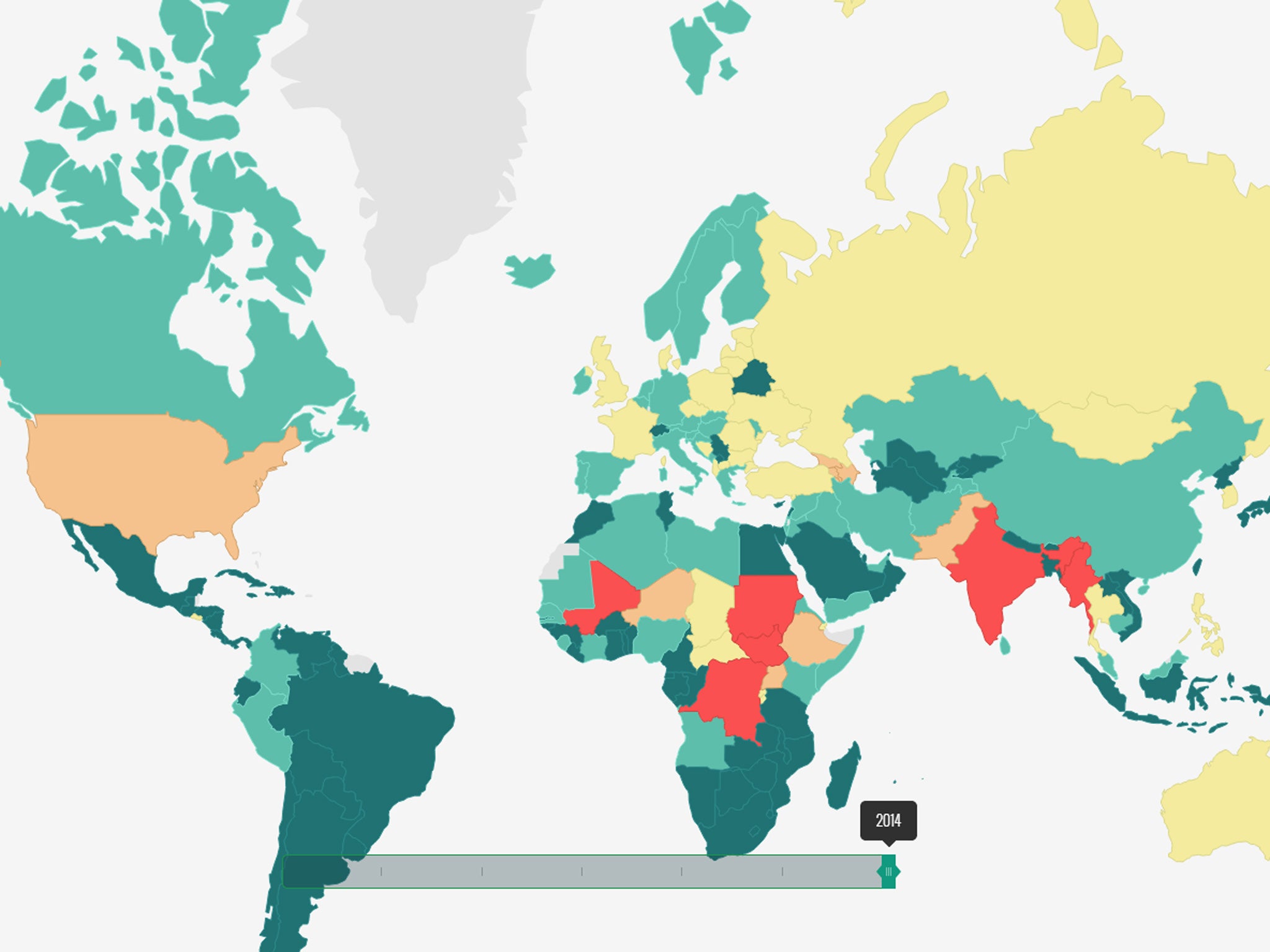World peace? These are the only 11 countries in the world that are actually free from conflict
As new wars and civil unrests seem to be flaring up every week, we look for the only countries in the world that could be considered ‘conflict-free’

Your support helps us to tell the story
From reproductive rights to climate change to Big Tech, The Independent is on the ground when the story is developing. Whether it's investigating the financials of Elon Musk's pro-Trump PAC or producing our latest documentary, 'The A Word', which shines a light on the American women fighting for reproductive rights, we know how important it is to parse out the facts from the messaging.
At such a critical moment in US history, we need reporters on the ground. Your donation allows us to keep sending journalists to speak to both sides of the story.
The Independent is trusted by Americans across the entire political spectrum. And unlike many other quality news outlets, we choose not to lock Americans out of our reporting and analysis with paywalls. We believe quality journalism should be available to everyone, paid for by those who can afford it.
Your support makes all the difference.With the crisis in Gaza, the rise of Islamist militants in Iraq and Syria and the international stand-off ongoing in Ukraine, it can sometimes feel like the whole world is at war.
But experts believe this is actually almost universally the case, according to a think-tank which produces one of the world’s leading measures of “global peacefulness” – and things are only going to get worse.
It may make for bleak reading, but of the 162 countries covered by the Institute for Economics and Peace’s (IEP’s) latest study, just 11 were not involved in conflict of one kind or another.
Worse still, the world as a whole has been getting incrementally less peaceful every year since 2007 – sharply bucking a trend that had seen a global move away from conflict since the end of the Second World War.
The UK, as an example, is relatively free from internal conflict, making it easy to fall to thinking it exists in a state of peace. But recent involvement in foreign fighting in the likes of Afghanistan, as well as a fairly high state of militarisation, means Britain actually scores quite poorly on the 2014 Global Peace Index, coming 47th overall.
Then there are countries which are involved in no actual foreign wars involving deaths whatsoever - like North Korea – but which are fraught by the most divisive and entrenched internal conflicts.
The IEP’s findings mean that choices are slim if you want to live in a completely peaceful country. The only ones to achieve the lowest score for all forms of conflict were Switzerland, Japan, Qatar, Mauritius, Uruguay, Chile, Botswana, Costa Rica, Vietnam, Panama and Brazil.
And even those countries are not entirely exempt from other problems that, the IEP says, could lend to conflict further down the line.
In Brazil and Costa Rica, for instance, the level of internal conflict may be the lowest possible – but civilian access to small arms and the likelihood of violent demonstrations are worryingly high.
Switzerland is famously detached when it comes to any external conflict, and has a very low risk of internal problems of any kind – but loses a number of points on the overall index because of its proportionately huge rate of arms exports per 100,000 of the population.
The IEP says that for a country to score at the lowest level for all its indicators for conflict, it must not have been involved in any “contested incompatibility that concerns government and/or territory where the use of armed force between two parties, of which at least one is the government of a state, results in at least 25 battle-related deaths in a year”.
Harder still, analysts from the Economist Intelligence Unit must be satisfied that it has “no conflict” within its borders. This rating on civil unrest cannot even include “latent” conflict involving “positional differences over definable values of national importance”.
The Global Peace Index measures the latest data up to the end of the year before – meaning that the state of international conflict right now is actually even worse than the study suggests. With the protests over the World Cup still vivid in collective memory, for instance, Brazil might find itself off the list of peaceful countries by 2015.
Speaking to The Independent, the director of the IEP Camilla Schippa warned that the state of peace in our time has been “slowly but steadily decreasing” in recent years.

“Major economic and geopolitical shocks, such as the global financial crisis and the Arab Spring, have left countries more at risk of falling into conflict,” Ms Schippa said.
“In the last year we have seen a large increase in terrorist activity, a resurgence of conflict in Gaza, and no resolution to the crisis in Syria and Iraq.
“Outside of the Middle East, civil unrest in Ukraine has turned into armed rebellion, and there has been increasing violence in South Sudan and the Democratic Republic of the Congo.”
She added: “Continuing global unrest means that there is unlikely to be a reversal of this trend in the short run.”
To explore the 2014 Global Peace Index in full, visit the IEP’s website here.
Join our commenting forum
Join thought-provoking conversations, follow other Independent readers and see their replies
Comments